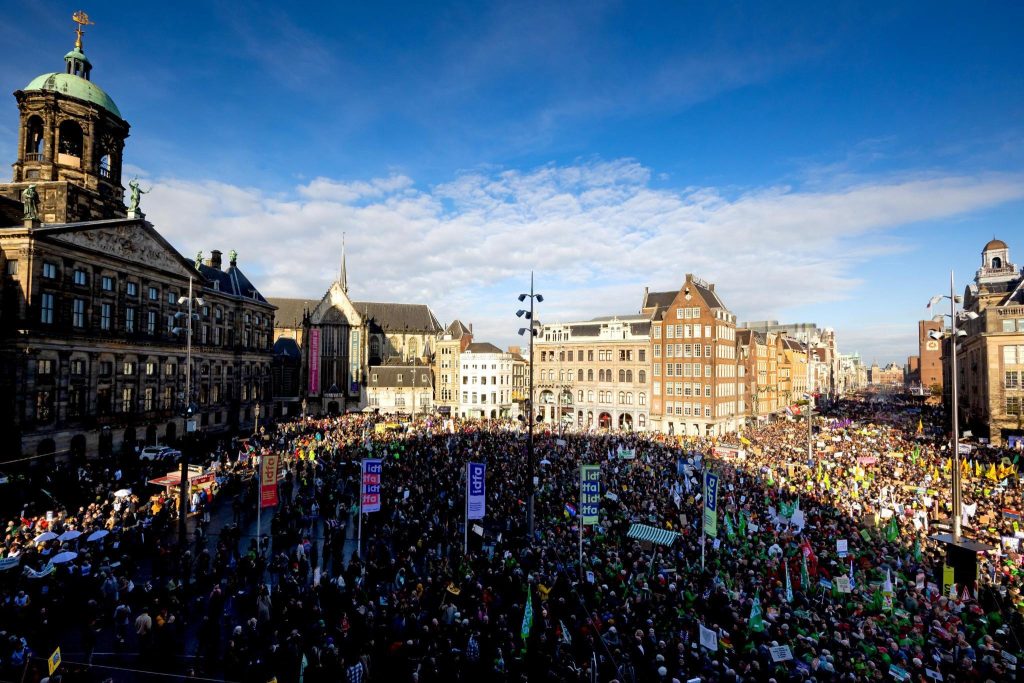The crisis is now. The climate and nature crisis threatens everything we hold dear. Droughts, heatwaves, and floods are causing casualties, chaos, and destruction right now. People are forced to flee, and our future is at stake. But what are big companies doing? They continue to finance and facilitate new destructive projects that exploit people and the environment. A livable world is slipping through our fingers.
And those least responsible for it suffer the most. That’s why on Friday, May 31, we will take to the streets again for a just future. Together, we will show these companies that we have had enough.
Because their profit is our loss. Making money comes at the expense of the health and safety of communities worldwide. Banks, insurers, and fossil fuel multinationals keep adding fuel to the fire. The food, the air we breathe, the drinking water, the farmland, and the forests: everything is polluted. This exploitation of nature goes hand in hand with the exploitation of workers. They do not receive a fair and livable wage because corporate profits are more important. The economy exists for us, for people, not the other way around.
It’s time for workers and citizens to regain control over the direction of companies so that businesses work for society, nature, and the climate instead of a small group of shareholders. While the crisis hits people from all parts of the world hard, these shareholders get richer. Fight for your existence and tackle the shareholders!
The government is also failing and not taking responsibility. Companies are hardly tackled. Worse, the government maintains these companies’ polluting ways of production with permits, billions of euros in subsidies, and legal advantages that protect companies against climate measures. Influenced by a powerful lobby, politicians listen to the big polluters.
Not only here but also in the rest of Europe. Just before the European elections, we are therefore sending a signal: enough is enough. If we unite our voices, no one can ignore us. No lobbyist, no politician, no shareholder. It’s time to prioritize the well-being of people and the planet over shareholder profits.
Companies must be immediately forced to take responsibility for their behavior. That’s why on Friday, May 31, we will transform Amsterdam’s Zuidas into the center of change. The Zuidas is the symbol of the power of large polluting companies; this is where the billions in profits are made at the expense of people, nature, and the climate. Here, shareholders take precedence over the well-being of people and the planet. Here, powerful companies in their gleaming skyscrapers determine what the future will look like. We are going to change that this Friday.
Join the Climate March. Stand side by side with those already suffering from the effects of the climate crisis and come with us to the Zuidas on May 31. We will take to the streets en masse to pressure the polluters and profiteers. For a world where our planet thrives, people flourish, and companies serve us all. Where people come before profit. Take back your share of the future and that of the earth!
Phase out all subsidies, financing, investments, and insurance for the fossil fuel industry. Use the money for a fairer world where those who are currently hardest hit – here and abroad – are compensated.
Give workers, concerned citizens, and the government more say in the direction of large corporations. Let them play a decisive role in making the company more social and sustainable.
Place the heaviest burdens on major polluters, not on people. Invest in good green jobs, affordable public transport, and more insulated social housing.
Climate protests are growing in the Netherlands! In recent years, more and more people have been participating in climate demonstrations. The climate movement has organized various protests over the years.
One of the first mass climate protests in the Netherlands took place on September 21, 2014, in Amsterdam. 5,000 people gathered during the People’s Climate March, which was organized just before the climate summit in New York.
A year later, Amsterdam was once again the backdrop for a climate protest. On November 29, 2015, 7,000 people marched during the Climate Parade, just before the climate summit in Paris that year.
The following year saw even higher turnout. On April 29, 2017, approximately 8,000 people took to the streets for the Climate March in Amsterdam.

2019 was an activist year for the climate movement with a total of three major demonstrations. On February 7, 2019, students took to the streets en masse in The Hague during the Climate Strike. More than 10,000 young people (and older individuals) gathered at Malieveld.
A month later, on March 10, 2019, the Climate March took place. A staggering 40,000 people from all over the Netherlands made their way to Amsterdam, walking from Dam Square to Museumplein despite pouring rain.
In the fall, it was once again the students who massed in action during a new Climate Strike. This time, on September 27, 2019, 35,000 concerned citizens headed to The Hague.
Due to COVID-19, the next mass protest could only take place in 2021. On March 4, 2021, 35,000 people made their voices heard during the Climate Alarm, which took place across the Netherlands.
A few months later, on November 6, 2021, another Climate March took place in Amsterdam. Organized just before the climate summit in Glasgow, this protest attracted 40,000 people.
The following year, Rotterdam was the venue for a Climate March for the first time. “No words, but actions!” shouted approximately 10,000 people on June 19, 2022.
2023 was once again a significant year for the climate movement, starting on September 9, 2023. The support demonstration for the A12 blockades by Extinction Rebellion and the blockade itself brought an estimated 25,000 people to the streets.
Later that year, the largest climate protest ever in the Netherlands took place. On November 12, 2023, 85,000 people marched to Amsterdam for the March for Climate and Justice. During this event, world-famous activist Greta Thunberg addressed the crowds at Museumplein. It was one of the largest demonstrations in the history of the Netherlands.
The March for Climate and Justice is an initiative by the Dutch Climate Crisis Coalition, which is a collaboration between nine different organizations and groups: Oxfam Novib, Fridays For Future, Greenpeace, Extinction Rebellion, De Jonge Klimaatbeweging, Fossielvrij NL, Milieudefensie, Grootouders voor het Klimaat and DeGoedeZaak. The protest itself is organized by a team of passionate people like you, as well as a large number of enthusiastic volunteers – and of course we would be nowhere without the people who donate to this cause.
Listen to the science and be honest about the consequences of the climate and nature crisis. The earth is heading for uncontrolled warming and total disruption of our environment. The only answer is rapid change: regulate big polluters, stop destruction of lives and habitat, and reduce greenhouse gases to the maximum. Deforestation must stop and we must become climate neutral as soon as possible to limit global warming. Involving citizens in this process is essential. As a rich country, we have a great responsibility.
Oil, coal and gas are warming the earth and are drivers of conflict and war. Therefore, stop fossil subsidies immediately, divest from fossil and block new fossil projects. Ban the greenwashing of the fossil lobby through advertising, sponsorship and marketing and listen to the citizens instead. The government must also commit to fewer flights at Schiphol Airport, scrapping Lelystad Airport and investing in sustainable alternatives.
The climate and nature crisis is an inequality crisis. Globally, the most vulnerable are hardest hit, even though they have contributed the least to the problem. These groups often already face oppression, conflict or the effects of colonialism. Vulnerable groups and countries must be supported in the sustainable transition and to adapt to the changing climate. Climate refugees must be recognized, protected and accommodated. Indigenous groups, important nature and biodiversity protectors, must be given land rights. There must also be far-reaching compensation to restore habitat and livelihoods for affected communities worldwide. The Dutch government has a duty to listen to perspectives of affected communities and involve them in solutions. The climate and nature crisis does not stop at our border.
The big polluters and the richest 1% who caused the problem as well as enriched themselves for decades with pollution and the destruction of nature must also bear the heaviest burden. They bear the responsibility and must contribute to transition, restoration and compensation. We want their money to be invested in citizens, especially those with the least resources, for example by insulating homes and investing in healthcare and education.
We want security and perspective for everyone currently still working in sectors whose emissions and/or energy consumption must be greatly reduced. Government and companies can offer guarantees with retraining and permanent, well-paying jobs in, for example, energy transition, healthcare or education. Ensure that everyone who makes the transition to a less polluting job can take advantage of this support scheme. Every working person with a (new) job should be able to do so on good terms and conditions of employment.
The Dutch energy supply still comes largely from fossil fuels. Sustainable scale-up at sea and on land is needed. The extraction of resources needed for the transition must not be at the expense of communities and nature, especially in the global south. The transition must go hand in hand with energy conservation. Public control and benefit for citizens are central to this, as is concern for nature. Nuclear power plants are not part of the solution.
The Dutch agricultural system squeezes out farmers and preys on nature. True nature-inclusive circular agriculture with a lot fewer animals is the future, and price guarantees for healthy food are needed. Farmers deserve support in the transition to this alternative system and must be given the opportunity to practice their profession in an honest, sustainable way, in harmony with nature.
Biodiversity is hollowing out: nitrogen problems, microplastics, mountains of waste. Forests are being cut down on a large scale, both within the Netherlands and abroad. This is incompatible with the need for CO2 uptake by plants and trees, and for healthy ecosystems. The government must therefore invest in nature restoration and biodiversity on a large scale and in cooperation with the local population. Nor should it lose sight of the sustainability of climate solutions. Tackling the climate crisis and the nature crisis go hand in hand.


Join the Climate March. Stand side by side with those who are already suffering from the consequences of the climate crisis, and come with us to the Zuidas on May 31st. En masse, we will take to the streets to put pressure on the polluters and profiteers.
© Climate March 2022 | WEBDESIGN by WOODPACK AGENCY